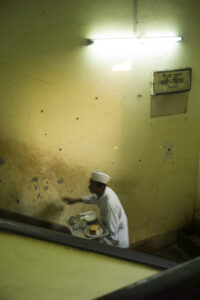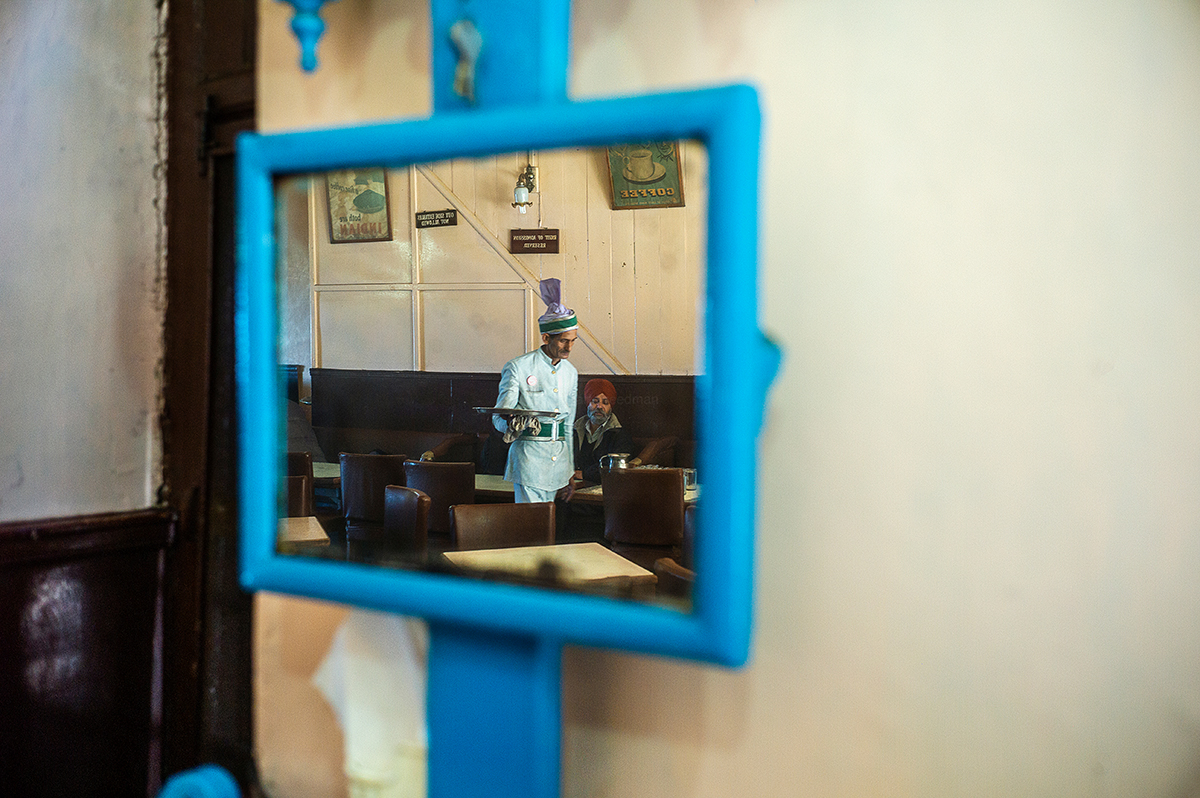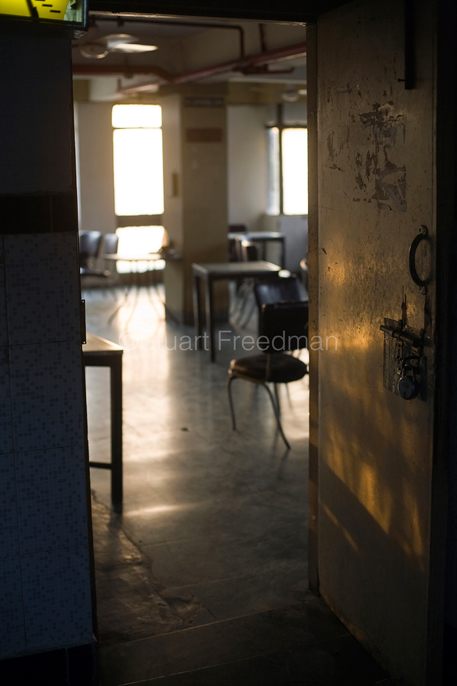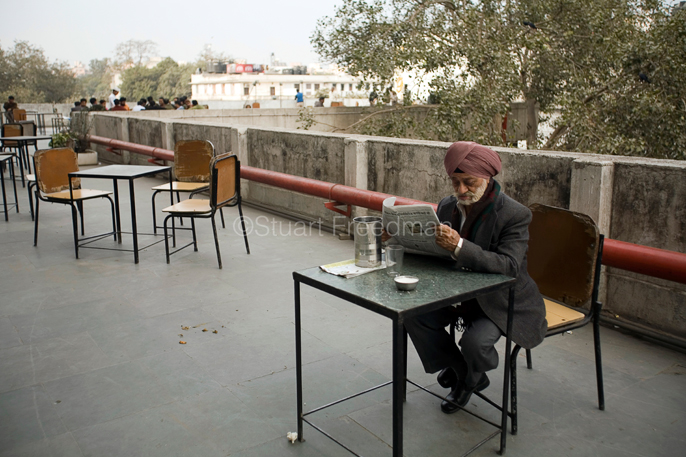I’m delighted to be giving a talk at the opening of an exhibition of my work on the Indian Coffee Houses at Ropes&Twines in Liverpool on Thursday 2nd February, 7-10pm – organised by the wonderful 6x6Gallery.

I was recently invited by the Museum of Art and Photography in Bangalore to speak about my work on the Indian Coffee Houses. I was joined by the Australian artist Alana Hunt who spoke about her work on chai in Kashmir.
You can see the interview here.
During Lockdown, like many people, I’ve spent some time looking over my archives. On my infrequent Instagram postings, I’ve decided to feature three images that were in the mix for my second book, The Palaces of Memory – Tales from the Indian Coffee House, but never made it. The editing process was very thorough and sometimes you have to let go of pictures that you like and think are strong but simply don’t fit a narrative. That was true of so many photographs that I made over the years on this project. Never so much as the image below however.
It was made in Shimla on a freezing cold, three-day trip staying in a miserable budget hotel, a twenty minute walk from town. The frame, shot on a really awful early digital Leica (an M9) seemed to encapsulate my feelings echoed in the face of the waiter on the first day. I didn’t like Shimla that much. I just saw a tatty old British capital playing on its dubious heritage, packed full of noisy tourists. But maybe that was just me on those days – the rest of Himachal Pradesh remains beautiful. The Coffee House was nice though. Welcoming and warm.
I remembered that I’d arrived in the evening after a long drive from Delhi with my long-time driver/fixer/partner-in-crime, the late and much missed, Armajeet Singh.
I wandered alone into the warm fug of the half-empty coffee house late at night. There were pictures to be had and now, years later, I remember the yellow light and the steam, but I hesitated and shot nothing preferring to just look. I had a coffee and left, angry at myself for not pushing harder. It was however, a cold calculation born of not wanting to make a mistake before I’d had chance to ask permission properly and work out the lay of the land. Of course, when I went back over the next couple of evenings, it was never the same.
It never is.
Perhaps that’s why the waiter’s face chimed with my mood when I made this picture the next morning. You always end up photographing yourself in one way or another. Photography’s funny like that. The frame often has you in it, even though you’re not…
It was certainly how I felt when I was just starting the project and was unsure where it would go or whether it would work.
I’ve always liked the image however.

Really delighted to have a spread of my work on India’s iconic Coffee Houses in the new issue of Exit Magazine. The issue’s theme is cafes, bars and nightclubs and I share the edition with the work of Brassai, Martin Parr and Anders Peterson. You can see the whole magazine here.
I’m delighted to report that my new book, The Palaces of Memory, Tales from the Indian Coffee House will be published in September by Dewi Lewis. See here for details.
I’ve just discovered that one of my favourite Indian Coffee Houses, in Kollom, Kerala was closed in January.
I photographed there for an afternoon when I was working down there this time last year.
Over the years on this blog, I’ve written numerous times about my love for these places that hold a memory of an older, more gentle India…


The Hindustan Times has reported that the Indian Coffee House in New Delhi, my favourite haunt for a dozen or more years, will now finally close because of unpaid rent. According to the ‘paper, “…the civic agency has finally told them to vacate the premises by the end of the month.” Pratap Singh, manager of Indian Coffee House is quoted as saying “We owe them nearly Rs 55 lakh as rent and interest apart from the monthly rent. We don’t have so much of money as our sales have dipped over a period of time.”
I first wrote about the Coffee House on this blog in June 2009 when I compared it to the great post-war classic cafes in London. Only last month Effillee magazine in Germany published a spread of my work shot over two years in the place. In that piece I tried to explain how I felt that the Coffee House was a kind of critical aide-memoire to Post Independence Delhi. I said that:
The Indian Coffee House is buried deep in the collective memory of Delhi. Perhaps never as flamboyant as its cousins in Calcutta on Bankim Chatterjee Street and Chittaranjan Avenue where Satyajit Ray et al held court, its presence is like a reincarnating deity. Stuck on a corner of one of the radials of the Colonial city, seen from above it is like a spur, preventing the wheel of Connaught Place fully turning and making itself into a Western High Street. It locks down an older geometry like a portal to the past. It will not let Delhi, always a city of trauma (from the destruction of Old Delhi to the Sikh riots of 1984) forget itself. Delhi is a palimpsest of cities (seven, eight, nine?) and if you look carefully the past is barely below the surface.
I am sad that a place that I cherished so dearly will close but sadder – and more concerned for the staff – cut adrift in a cruel city that has no time for the poor and those down on their luck. I am also sad because the Coffee House with a little imagination could have worked. Malvika Singh, that most extraordinary of Delhi-wallahs (and publisher of Seminar) who I interviewed for the Effillee piece argued, quite simply that with a little imagination (and a bit of a paint-job) someone could turn the place into something special and profitable whilst preserving the character of the place. Only last week I ate in Dishoom – a very good pastiche of a Mumbai street cafe in London. Someone recognised that people will pay good money to eat somewhere that is not an Americanised chain selling plastic, mediocre food and expensive coffee. Someone obviously realised that people might want to spend time in places like this that have at least a stab at a cultural resonance…
The loss I think will be keenly felt – the last time they tried to close the cafe there was a minor public outcry. I can only hope that this will happen again and someone will step into the breach. I suspect however, that, as the unnamed official in the Hindustan Times piece salivated, “Once they vacate we will start the procedure of renting it out and we are hoping to get a rent at a rate of at least R400 per sq ft”, this really will be the end. The shame is of course that the coffee shop’s closing is a metaphor for what India and Delhi in particular, is running headlong into: a mishmash of Market-led, corporate half-truths that will be the disaster that this short term, only-for-profit thinking has brought all across the world. Delhi doesn’t need another fake Western, air conditioned soulless hang-out that caters for the tiny minority that can afford to eat there living out some 1980’s fantasy of wealth. It has plenty of those already.
The plain truth is that the closure marks the victory for an imported mindset that knows the price of everything but the value of nothing.





Here’s a recent tearsheet from the May/June 2011 edition of the rather lovely German Magazine, Effilee with my long term piece about the Indian Coffee House in New Delhi.
Effilee is a food and lifestyle magazine who commissioned the images and a 5000-word piece from me. The English translation can be found under the Writings section of my website here.
The piece is called The Palace of Monkeys and Memory